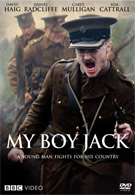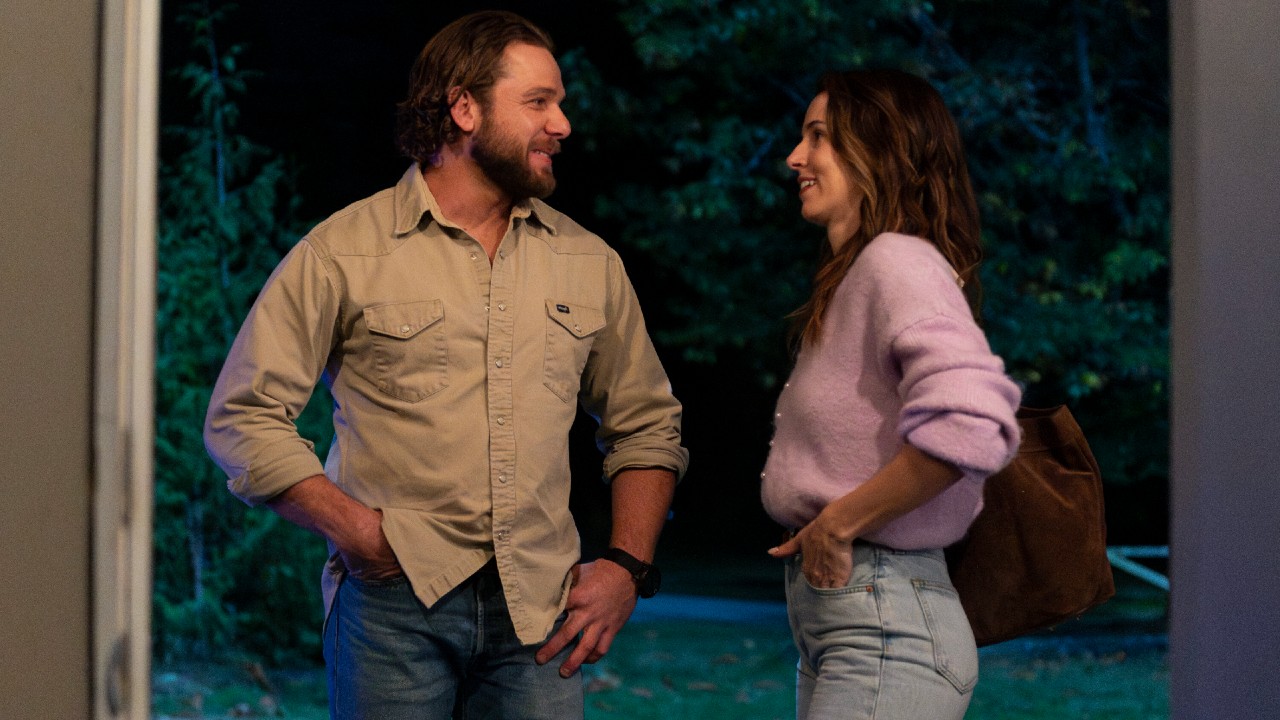I could probably come up with a million different jokes about the decision to cast the floozy from Sex and the City (Kim Cattrall) and Harry Potter (Daniel Radcliffe) as a mother and her son. But, since they are mother and son in My Boy Jack, all the wand-waving and wand-handling, broom-riding, and love-spell casting jokes are kind of out of the question. So are the jokes about that disgusting case of Hogwarts, and what was seen in Harry’s crystal balls. It just doesn’t seem like something to joke about any more. Would you joke about your mom that way? The year is 1914, and Rudyard Kipling (David Haig), one of the British Empire’s greatest supporters, is at the height of his literary fame. His son, Jack (Radcliffe), is determined to join fight in the war against Germany, but is dogged by poor eyesight (he’s shortsighted), something the English forces refuse to look past - that is, until Rudyard uses his influence to land Jack in the Irish Guards, despite objections from Caroline Kipling (Cattrall) and Jack’s sister, Elsie (Carey Mulligan). They, unlike Rudyard and Jack, fail to see the glory in fighting for one’s country, especially when so many lives are being lost. When Jack is off fighting the war, Rudyard is torn between his two greatest passions – his devotion to the King and country, and love for his family.
While this film is well-produced and well-acted, this is not a film that will garner a wide audience, not even with Harry Potter and the floozy as its main cast members. It’s one of those small BBC America films that will only be seen by fans of BBC, PBS, or Kipling enthusiasts. Director Brian Kirk does a really nice job setting the tone for the movie, but he’s working with a screenplay that lacks excitement and perspective outside of the Kipling family (a country is at war, yet the only opinions that matter are those of four people). Kirk’s camerawork, mainly his decision to pan away from his actors and actresses as they remain still so they look like portraits, and his use of putting the camera out of focus as Jack takes an eye test for the Army, is absolutely brilliant. During the war scenes, there are a few creative shots, including a few where the camera is actually held upside down as if it's the eyes of a fallen soldier. He does the best he can with what he was given to work with - for example, his use of simple, classical music also heightens emotional moments of the film.
The best part of My Boy Jack is Haig, who, besides being a dead-ringer for Kipling, also wrote the screenplay and produced the film. His performance is extremely well-rounded as a man who is clearly passionate about his work, his country and his family. You can tell he is an actor and writer who truly cares about the topic, even if the screenplay is nothing extraordinary. Haig’s performance carries the film, whether it is an emotional scene where the family interviews soldiers trying to find the whereabouts of his son, or a fun scene where the revered writer reads one of his stories to a group of children. It’s a great performance for a man who wrote the film either for his love of Kipling’s life and work, or just so he could have a vehicle where he could show off his talents.
As for Cattrall and Radcliffe, it's one of those cases where it's a bit weird seeing them out of their normal characters. I know this feeling is exactly what both actors are trying to avoid, but in this case, it seems unavoidable. Their performances are not bad as a whole, but they are, at times, very stiff. It’s almost like they were trying so hard not to be Harry and the slut. Radcliffe is very stiff, and also quite awkward. There is one scene in particular where he is teaching a child how to clean and take care of a motorcycle just before he is to ship off to war. As he talks to the child, it looks like he has to go to the bathroom – his voice is monotone and choppy, and he sits on a stool like there’s a large piece of wood keeping his back straight. He does not look comfortable, and that isn't the only scene. His war scenes are unrealistic – not the way they are shot in the film, but more the fact that he is leading these men into battle. It looks like a child trying to lead men. It looks like he should be at home playing cricket with his schoolmates. He’s just wrong for the role, even if in real life he is the same age as Jack.
Above all this, it's really weird seeing Harry Potter without the scar, the cloak, the wand, his two best friends, and sporting a mustache that has him looking like a pre-pubescent Hitler. It's also weird watching Cattrall wear something that covers her entire body and not trying to sleep with half the city. Cattrall, however, does have a few moments to shine, mostly after the Kipling’s receive a message saying their son is missing. It is at this point that you get the feeling that this is a mother grieving over the possible death of her son. Before her son goes missing, you’d just think she could be some uptight woman dressed like she belongs in Colonial Williamsburg. There is little emotion and depth to the performance prior to her son missing.
My Boy Jack suffers because of miscasting and a screenplay that comes up short of what the screenwriter intends. This is clearly a film that tries to tell an interesting story about a well-known historical figure and his family, but there’s something missing – like a reason to care. We know Jack is off at war, we know he is in danger, and we know that the family worries, even Rudyard. But, why should we care? Why should we be worried? Who is really telling the story? Is it the mom? Is it Rudyard? If it is Rudyard, why isn’t it written better? If the story of Jack Kipling is really the angle of the film (and it should be, since his name is in the title – even if “My Boy” refers to the parents telling the story), why does he still live in the shadow of his father? I am amazed that a DVD as well-produced as this one does not have more on it. There are beautiful images from the movie – some portraits of a loving Kipling family and some horrific images of soldiers in wartime – as music from the film plays in the background. However, the only options from the main menu are playing the movie, selecting a scene, turning subtitles on or off, or going to the special feature section, which only has two features. I know this is not a movie that was released in theaters, but if there is a lot of effort put into making the product look as flawless as this does, it wouldn’t hurt to throw in a little extra incentive to purchase the film.
The two special feature sections include deleted scenes and interviews. The deleted scenes section is 26 minutes of five or six scenes that were deleted from the film – only one of which features Jack Kipling. One scene, however, caught my interest. It was seemingly an extension of a scene that is in the film, when Rudyard Kipling is speaking in an assembly hall about the war and how volunteers are necessary to fight for the country’s honor. At one point in the scene, there is a sort of protest – people holding up a white sheet that says, “Murderer,” as Rudyard Kipling removes his glasses and wipes his brow as sweat builds up. This type of scene adds to a film. It shows that there are voices outside of Kipling’s wife and daughter that believe war is a bad idea. It shows controversy. But, the film lacks anything that is outside of the family’s voice, which is why you never get a sense of what anyone else truly thinks about the events of the film – you only get one perspective, which damages the film.
Your Daily Blend of Entertainment News
The interview section is actually pretty funny – albeit unintentionally. In the 24-minutes of interviews with Haig, Radcliffe and Cattrall, only one of the three comes off sounding as phony as a college kid trying to get into a bar. While Haig and Radcliffe seem to talk about the story itself, and how tragic and beautiful it is, Cattrall comes off sounding like a typical Hollywood robot giving a book report on her first day back in school. Maybe it’s because Radcliffe and Haig speak with a British accent and it sounds more honest, but I don’t think so. They speak about the characters more so than the final result of their efforts, whereas Cattrall starts off with a typical response, “At the beginning, you know, of our story My Boy Jack …”
Seriously, could we at least try to act smarter than a third-grader? And we wonder why other countries hate us so much? We have two people basically adoring the characters of the film and what they feel for each, and Kim Cattrall comes on and talks like she should have a pop-up diorama next to her as she tries to explain the book she just read. Seriously, I know Rudyard Kipling married an American woman and Cattrall is a fine actress, but couldn’t the producers of the DVD have spoken to the people who actually know who Rudyard Kipling is, rather than the woman who thinks she knows who he is because she read the script to the movie, and watched the cartoon version of The Jungle Book?

